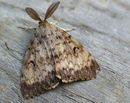Annual Review of Entomology (2016) 61, 99-117
From Pestinfo-Wiki
 | Selected publication you are invited to contribute to the discussion section (above tab) |
The genetic basis of pheromone evolution in moths
Annual Review of Entomology 61, 99-117
Abstract: Moth sexual pheromones are widely studied as a fine-tuned system of intraspecific sexual communication that reinforces interspecific reproductive isolation. However, their evolution poses a dilemma: How can the female pheromone and male preference simultaneously change to create a new pattern of species-specific attraction? Solving this puzzle requires us to identify the genes underlying intraspecific variation in signals and responses and to understand the evolutionary mechanisms responsible for their interspecific divergence. Candidate gene approaches and functional analyses have yielded insights into large families of biosynthetic enzymes and pheromone receptors, although the factors controlling their expression remain largely unexplored. Intra- and interspecific crosses have provided tantalizing evidence of regulatory genes, although, to date, mapping resolution has been insufficient to identify them. Recent advances in high-throughput genome and transcriptome sequencing, together with established techniques, have great potential to help scientists identify the specific genetic changes underlying divergence and resolve the mystery of how moth sexual communication systems evolve.
(The abstract is excluded from the Creative Commons licence and has been copied with permission by the publisher.)
Link to article at publishers website
Database assignments for author(s): Astrid T. Groot, David G. Heckel
Research topic(s) for pests/diseases/weeds:
pheromones/attractants/traps
Pest and/or beneficial records:
| Beneficial | Pest/Disease/Weed | Crop/Product | Country | Quarant. |
|---|